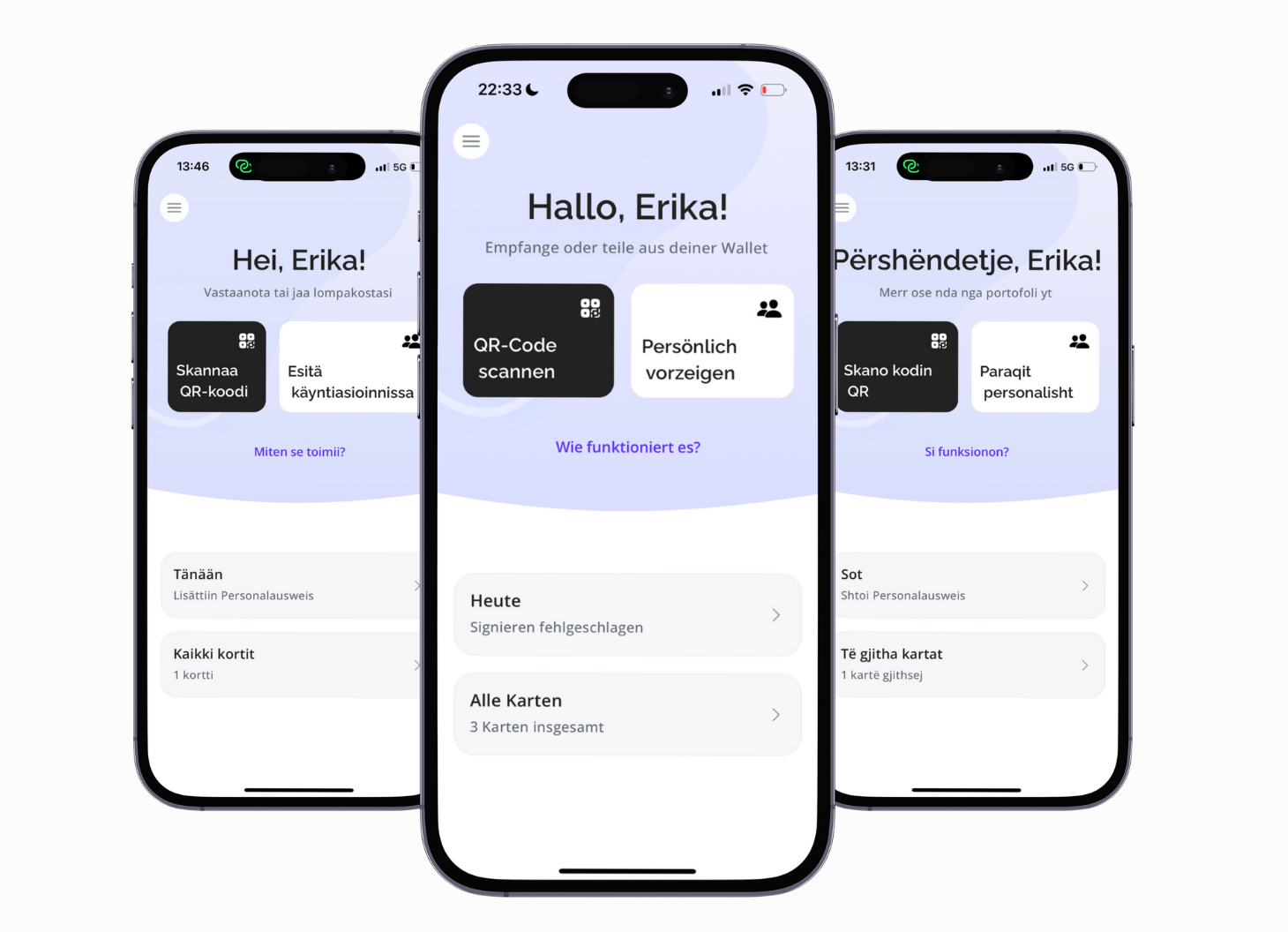After more than a year of prototyping, iterating, and collaborating, the EUDI Wallet Funke project (organized by the German government to promote innovation in EUDI Wallets) is coming to an end. We're very proud to share what we’ve built with you, and maybe even more excited for you to actually take what we've built and use it in your own project.
In this article, we'll go through all of the components we worked on, and show you how you can use them in your digital identity projects. If you have questions, want to pilot the wallet, or collaborate on a project, reach out to our CEO Ana Goessens.
🔧 What we built
As part of the SPRIND-funded innovation competition, Animo Solutions developed a secure, user-friendly, and open-source European Digital Identity (EUDI) Wallet. The wallet is made to receive credentials, manage credentials, and receive verification requests. It contains specific flows such as the authorization code flow for issuance, the transaction data presentation flow for QES signing, and in-person verification over bluetooth.

Built on top of the Credo framework, and aligned with the European Digital Identity Architecture and Reference Framework (ARF), the wallet is now in open beta and its stable version is available for download on iOS and Android. In the next release the final SPRIND-specific innovations will be added to the stable wallet version in app stores. For the code itself you can visit the Wallet repository.
Beyond the application, which you can install, the foundations are also open-source and can be used to build your own projects: the wallet code, a wallet SDK, the Credo framework, and several libraries are published under Apache 2.0. Animo will continue to maintain these projects, and promote them in the digital identity community.
💪 How you can use it
Here's an overview of everything we built during the SPRIND Funke competition that you can use in your digital identity projects.
The Wallet
Let's start with the wallet. There are many uses for the wallet, maybe you are a relying party and you want to enable people to receive your credentials or verification requests. Maybe you are working on a wallet yourself and want to start from an existing base.
- Download the stable wallet on iOS
- Download the stable wallet on Android
- Use the code repository to fork your own project or to learn how a wallet works. Note: this repository contains both the main (stable) Paradym wallet, and the more experimental EUDI Prototype wallet, these will be merged in the future but can now be seen separately.
- Install the Wallet SDK to adapt your existing React Native applications to add wallet functionality. The SDK is useful if you want to add credential-related functionality to an existing app. We recently published the first experimental alpha release of the Wallet SDK, and will work towards a more stable release over the coming weeks and months.
The Framework
Credo is a framework written in TypeScript for building decentralized identity solutions that aims to be compliant and interoperable with identity standards across the world. The project is community-maintained and hosted under the OpenWallet Foundation.
Because Credo is platform agnostic, with out of the box support for Node.JS and React Native, you can use the framework to build Issuers, Verifiers, and Wallet solutions. The framework is used by governments and institutions and is constantly improving and implementing the newest standards.
Within Credo you'll find support for OpenID for Verifiable Credential Issuance, OpenID for Verifiable Presentations and the OpenID High Assurance Interoperability Profile. The EUDI credential formats, SD-JWT VCs and ISO/IEC 18013-5 Mobile Drivers License are supported in Credo. We suggest to read the documentation and join the community calls to get started.
Credo, the community behind it, and its effort to align with global standards has been going long before the Funke project, and a lot of work was put in by the community to align with EU standards and protocols. The framework will continue to iterate and progress towards it's goal to be a solid technical base for global interoperability.
Libraries
Several libraries were created during the SPRIND Funke for more specific lower level functionalities.
Under the OpenWallet Foundation
- OpenID4VC, a low level OpenID4VCI / OpenID4VP implementation in TypeScript
- DCQL, a TypeScript implementation of the DCQL query language
- OpenID Federation, a TypeScript implementation of OpenID Federation
Under Animo Solutions
- Expo mDoc Data Transfer, a React Native library for in-person proximity presentation of mDOCs, based on the EU reference implementation
- Expo Digital Credentials API, a React Native library to add support for W3C Digital Credentials API
- Expo Secure Environment, a React Native library to integrate with iOS and Android Secure Element
- EUDI Wallet Functionality, an EUDI-specific extensions for Credo (e.g. RP A&A)
- mDoc, a TypeScript implementation of mDL/mDoc specification
Whether you're building a verifier, extending a wallet, or testing a new business case, these resources can help you move forward your development timeline while staying aligned with the EUDI standards.
You can see the wallet in action through our playlist.
🥂 Thank you, and what’s next
We’re grateful to SPRIND for creating a space to explore and build innovative ideas. Working together with such an expertise-laden team was a joy.
We're continuing development on the EUDI Wallet Prototype, and testing it in new use cases with the Findynet Cooperative and several partners in Education, Banking, and more. The wallet will remain an open-source project, and will maintain compliance and compatibility with the Paradym platform. Reach out to us if you want to explore your solution's production or pilot-level deployment with Paradym or the EUDI Wallet Prototype.
As the closing conference kicks off, we’re looking forward to celebrating what’s been achieved, and even more to what’s next. The prototypes may be ending, but the real work has just begun.

